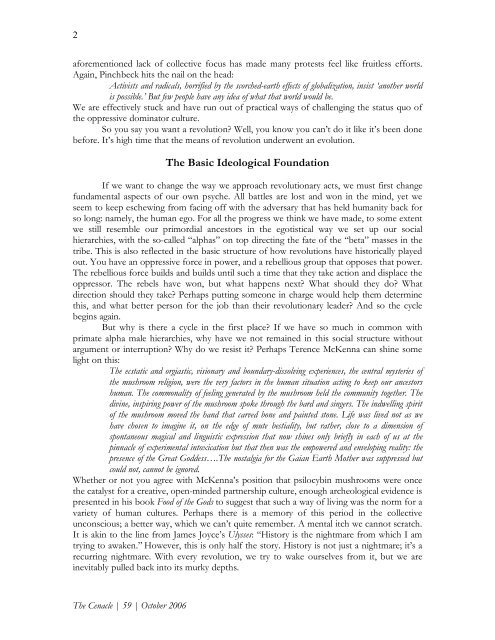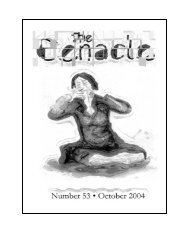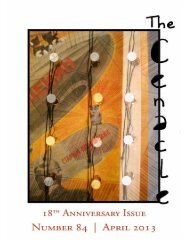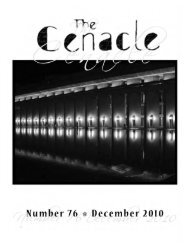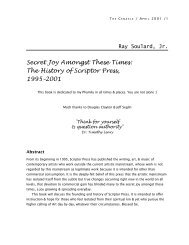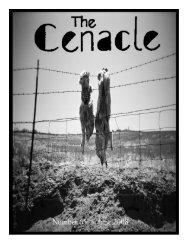Raymond Soulard, Jr. New Songs (for Kassandra) - The ...
Raymond Soulard, Jr. New Songs (for Kassandra) - The ...
Raymond Soulard, Jr. New Songs (for Kassandra) - The ...
You also want an ePaper? Increase the reach of your titles
YUMPU automatically turns print PDFs into web optimized ePapers that Google loves.
2<br />
a<strong>for</strong>ementioned lack of collective focus has made many protests feel like fruitless ef<strong>for</strong>ts.<br />
Again, Pinchbeck hits the nail on the head:<br />
Activists and radicals, horrified by the scorched-earth effects of globalization, insist ‘another world<br />
is possible.’ But few people have any idea of what that world would be.<br />
We are effectively stuck and have run out of practical ways of challenging the status quo of<br />
the oppressive dominator culture.<br />
So you say you want a revolution? Well, you know you can’t do it like it’s been done<br />
be<strong>for</strong>e. It’s high time that the means of revolution underwent an evolution.<br />
<strong>The</strong> Basic Ideological Foundation<br />
If we want to change the way we approach revolutionary acts, we must first change<br />
fundamental aspects of our own psyche. All battles are lost and won in the mind, yet we<br />
seem to keep eschewing from facing off with the adversary that has held humanity back <strong>for</strong><br />
so long: namely, the human ego. For all the progress we think we have made, to some extent<br />
we still resemble our primordial ancestors in the egotistical way we set up our social<br />
hierarchies, with the so-called “alphas” on top directing the fate of the “beta” masses in the<br />
tribe. This is also reflected in the basic structure of how revolutions have historically played<br />
out. You have an oppressive <strong>for</strong>ce in power, and a rebellious group that opposes that power.<br />
<strong>The</strong> rebellious <strong>for</strong>ce builds and builds until such a time that they take action and displace the<br />
oppressor. <strong>The</strong> rebels have won, but what happens next? What should they do? What<br />
direction should they take? Perhaps putting someone in charge would help them determine<br />
this, and what better person <strong>for</strong> the job than their revolutionary leader? And so the cycle<br />
begins again.<br />
But why is there a cycle in the first place? If we have so much in common with<br />
primate alpha male hierarchies, why have we not remained in this social structure without<br />
argument or interruption? Why do we resist it? Perhaps Terence McKenna can shine some<br />
light on this:<br />
<strong>The</strong> ecstatic and orgiastic, visionary and boundary-dissolving experiences, the central mysteries of<br />
the mushroom religion, were the very factors in the human situation acting to keep our ancestors<br />
human. <strong>The</strong> commonality of feeling generated by the mushroom held the community together. <strong>The</strong><br />
divine, inspiring power of the mushroom spoke through the bard and singers. <strong>The</strong> indwelling spirit<br />
of the mushroom moved the hand that carved bone and painted stone. Life was lived not as we<br />
have chosen to imagine it, on the edge of mute bestiality, but rather, close to a dimension of<br />
spontaneous magical and linguistic expression that now shines only briefly in each of us at the<br />
pinnacle of experimental intoxication but that then was the empowered and enveloping reality: the<br />
presence of the Great Goddess….<strong>The</strong> nostalgia <strong>for</strong> the Gaian Earth Mother was suppressed but<br />
could not, cannot be ignored.<br />
Whether or not you agree with McKenna’s position that psilocybin mushrooms were once<br />
the catalyst <strong>for</strong> a creative, open-minded partnership culture, enough archeological evidence is<br />
presented in his book Food of the Gods to suggest that such a way of living was the norm <strong>for</strong> a<br />
variety of human cultures. Perhaps there is a memory of this period in the collective<br />
unconscious; a better way, which we can’t quite remember. A mental itch we cannot scratch.<br />
It is akin to the line from James Joyce’s Ulysses: “History is the nightmare from which I am<br />
trying to awaken.” However, this is only half the story. History is not just a nightmare; it’s a<br />
recurring nightmare. With every revolution, we try to wake ourselves from it, but we are<br />
inevitably pulled back into its murky depths.<br />
<strong>The</strong> Cenacle | 59 | October 2006


